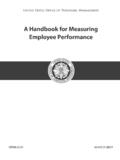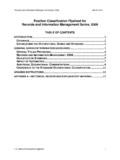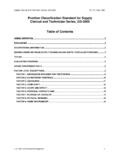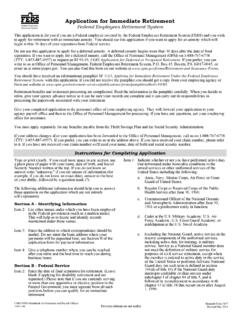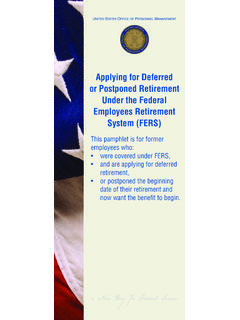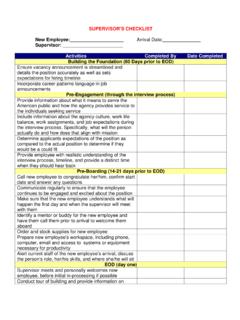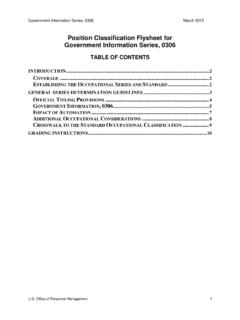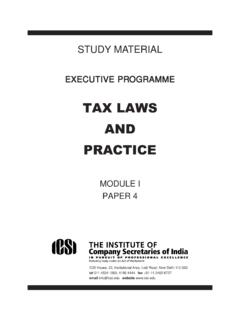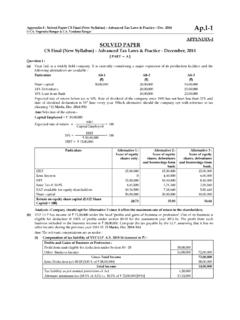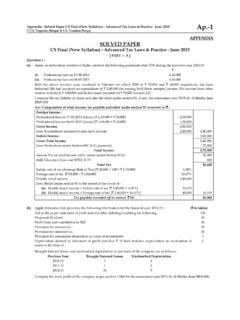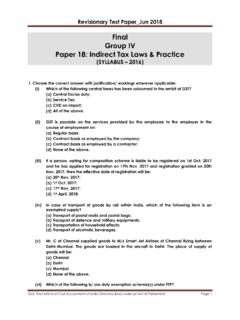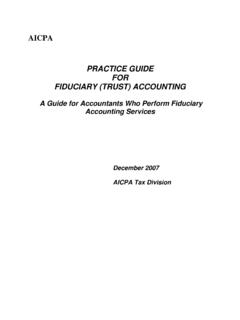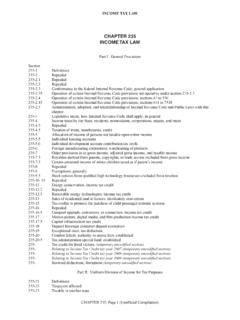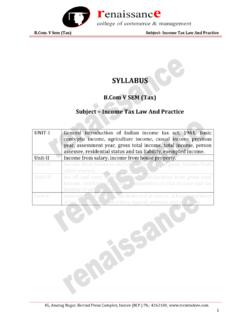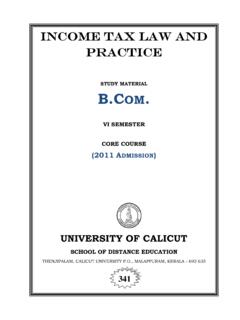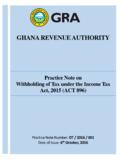Transcription of TAX ISSUES FOR AWARDS - OPM.gov
1 TAX ISSUES FOR AWARDS Introduction This paper addresses the impact of the various tax laws on the Government s AWARDS program and focuses on AWARDS given under the Governmentwide authority found in chapter 45 of title 5, U. S. Code. You will find the regulations on AWARDS discussed here in part 451 of title 5, Code of Federal Regulations. These regulations include a specific provision that requires agency AWARDS programs to ensure they do not conflict with or violate any other law or Governmentwide regulation (5 CFR (a)). This requirement includes compliance with applicable tax rules such as withholding.
2 Changes in the tax laws over time have clarified the concept of what is taxable, which has been particularly important because employers now compensate employees in more ways than traditional pay and benefits. These forms of additional compensation often are called fringes or perks. An award is something bestowed or an action taken to recognize and reward individual or team achievement, including incentives based on predetermined criteria. Agency Tax Obligations Federal agencies are employers of their common law employees for employment tax purposes.
3 Cash you provide to your employees as compensation ( , salary, wages, and supplemental wages) is generally taxable. Taxable fringe benefits are those items (often noncash) you provide to your employees that the Internal Revenue Service (IRS) views as supplemental wages ( , additional compensation). Some taxable fringe benefits, which are usually seen in the private sector rather than the Federal Government, might include membership in a private country club or athletic facility, or season tickets to sporting or theatrical events.
4 Fringe benefits are taxable unless they meet specific exclusion criteria. See Publication 15-B, Employer s Tax Guide to Fringe Benefits, for detailed information on the employment tax treatment of fringe benefits. Generally, tax liability carries a dual responsibility 1. Employees must pay taxes on compensation received. 2. You must withhold taxes for compensation paid, plus pay your share of the Federal Insurance Contributions Act (FICA) taxes. You must report as compensation ( , W-2 wages) and withhold taxes for 1. most cash payments; 2.
5 The fair market value of award items determined to be non-exempt, taxable fringe benefits; (See later section on Determining Fair Market Value.) and 3. award items considered to be cash equivalents. (See later section on Cash Equivalents.) As an employer, you have an obligation to comply with the IRS rules and regulations and withhold applicable taxes from an employee s wages. You are familiar with this withholding obligation regarding employee salaries and other cash payments, which has been in effect for a - 1 - long time. See Publication 15 (Circular E), Employer s Tax Guide, for detailed information on an employer s responsibilities for withholding, depositing, and reporting employment taxes.
6 However, it is only since January 1985 that the IRS clarified its application to the newer noncash fringe benefits. For example, employee parking on Federal property is a fringe benefit, and you must withhold taxes for the parking s fair market value to the extent it exceeds the value excluded by the Internal Revenue Code. Generally, only in large, metropolitan areas would the fair market value of such parking have to be reported as a fringe benefit because it exceeds the amount allowed to be excluded. Carrying out your tax reporting and withholding responsibility involves policy choices that you should develop in cooperation with your payroll officials and incorporate into your award program design and administration.
7 You should consider carefully the tax implications of using a particular type of award so that you can properly carry out your responsibility to withhold required taxes. However, after you have reviewed your various AWARDS and considered the impact of the IRS regulations, the practical effect may be that many, if not most, noncash AWARDS you use are not, in fact, taxable. The information in this paper describes things to consider when using your judgment to make these decisions, as well as some of the limits you will have to consider.
8 You are responsible for reporting the different kinds of compensation you give your employees and withholding the right amount. The Increasing Use of Noncash AWARDS In this era of reinvention, deregulation, and tight budgets, you are looking for new and innovative ways to reward your employees and stretch your AWARDS budget. To find new ideas, many of you are benchmarking best practices, often in private industry as well as not-for-profit organizations. What you are finding is that industry often uses, and highly recommends the effectiveness of, gift certificates or other cash equivalents, merchandise, and other noncash items used as incentives and recognition.
9 As a result, you are looking at the applicability and consequences of these types of AWARDS in the Federal environment. In addition to their overall appropriateness, another issue you need to consider is the tax implication of such AWARDS . Generally, the Government has limited its noncash award programs to honorary recognition using items such as plaques, certificates, and medals. These items clearly convey honorary recognition and do not run the risk of being mistaken for hidden or additional compensation, which could make them taxable as fringe benefits.
10 As you use more informal recognition and the noncash forms taken by both honorary and informal recognition broaden, you must pay more attention to whether these AWARDS could be considered to represent additional compensation and what tax implications that brings. Traditional certificates, plaques, medals, and pins usually are not taxable. - 2 - Taxing Cash and Cash Equivalents Cash and cash equivalents given as AWARDS are generally taxable, regardless of the amount. Checks are the most common form of a cash equivalent. Gift certificates and vouchers with a clear face amount are also cash equivalents.
